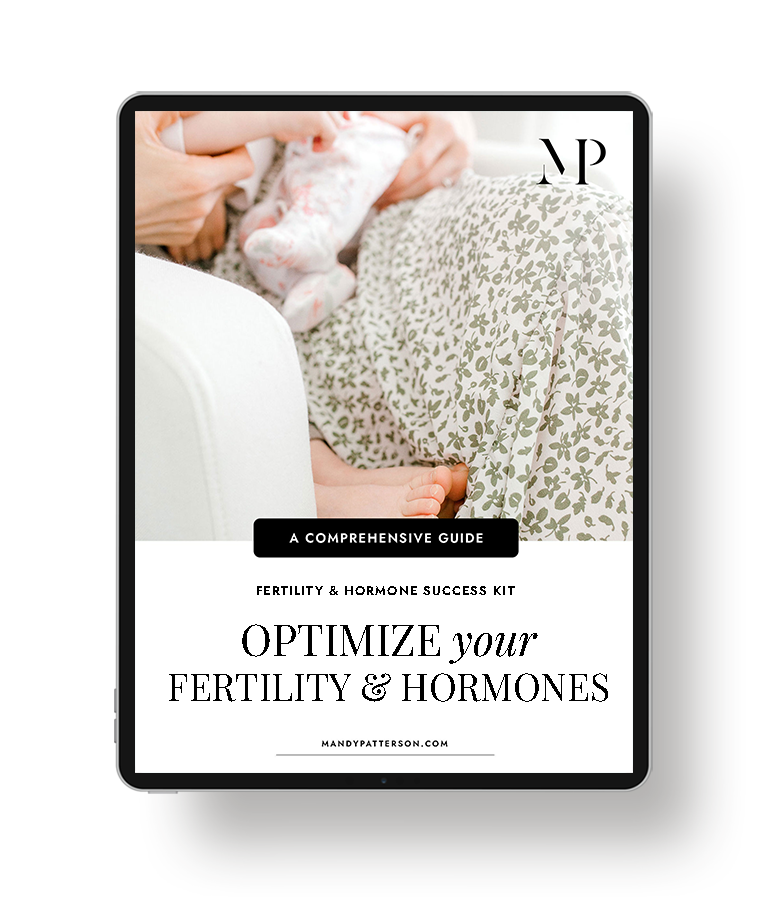What’s the big deal with thyroid dysfunction and infertility? Why should you care about that little butterfly shaped gland in your neck? If you’re pregnant or trying to get pregnant, keep reading for some of the most important information about thyroid dysfunction and fertility, because, trust me, it is important!
Thyroid disease affects up to 5% of American women of reproductive age and I believe this figure is sorely underreported based upon my patient population and research. Thyroid disorders interestingly are more commonly found in women than men and symptoms can include fatigue, cold sensitivity, hair loss, constipation, dry skin and weight gain. The American Thyroid Association estimates that up to 1% of pregnancies are impacted by hypothyroidism and up to 15% are impacted by subclinical hypothyroidism. Ladies, that’s a lot, and that’s just the numbers they know about! Many women will go their entire pregnancy without ever being screened for thyroid disorders.
What Are Thyroid Disorders?
So, what are thyroid disorders and how might it impact infertility? I wrote an article overviewing thyroid disorders, symptoms, and how to heal on my blog that you can read here. But, let me give you a quick refresher so we’re on the same page!
The thyroid is a crucial part of your endocrine system. It produces thyroid hormones (TSH, T4, T3) that are responsible for a variety of bodily functions. Those functions include metabolism, regulating your gut viscera, sleep, cholesterol, menstruation, and ovulation. So, yeah, it’s kind of obvious that it also affects your fertility and pregnancies.
Hyperthyroidism: this is when the levels of thyroid hormones are higher due to an overactive thyroid gland. Symptoms include unexplained weight loss, increased appetite, depression, feelings of anxiety, difficulty sleeping, and fewer menstrual cycles.
Hypothyroidism: this is when the levels of thyroid hormones are lower due to an underactive thyroid gland. Common symptoms of hypothyroidism include weight gain, fatigue, constipation, feeling cold, thinning hair, pale skin, and increased menstrual bleeding.
How Does Thyroid Dysfunction Affect Fertility?

Hypothyroidism and hyperthyroidism can affect both the ability to get pregnant and the ability to carry a baby to term.
Given the thyroid’s role in regulating menstruation and ovulation you can see how it might affect your fertility. Hypothyroidism and hyperthyroidism can affect both the ability to get pregnant and the ability to carry a baby to term. How is that possible? Let’s get into the details.
Thyroid disorders, without proper management, create a disruption in the luteal phase, or the last half of the cycle after ovulation. During this phase your body is supposed to make increasing amounts of progesterone. What does this mean if you have a thyroid disorder? If your thyroid disorder is unregulated, you will have difficulty getting pregnant because there will be no implantation. This also ties into an early miscarriage due to incomplete implantation. The following is a list of signs of low levels of progesterone:
- A shorter or longer cycle than your typical menstrual cycle
- Lighter or heavier bleeding than is typical for you
- Longer or shorter windows for bleeding than is typical for you
While thyroid disorders are known to disrupt progesterone production, they can also cause a series of other complications. For example, hypothyroidism has been implicated in anovulation, estrogen metabolism, circulating levels of sex hormone-binding globulin, and granulosa cells. In the International Journal of Applied Basics Medical Research in 2012, researchers took a sample size 0f 394 infertile women and found that 23.9% of them were considered hypothyroid (TSH > 4.2 uIU/ml). With treatment, 76.6% of those women went on to conceive within 6 weeks to a year. As a functional medicine practitioner that gets to the root cause of women’s issues, I like to see much lower TSH levels so this is a big deal and something to explore if you are dealing with infertility challenges!
That’s not all, thyroid disorders in men can also impact fertility. An unregulated thyroid disorder in men can damage the sperm quantity and motility. This makes it more difficult for sperm to enter the egg for implantation.
What is Subclinical Hypothyroidism?
Subclinical hypothyroidism is a controversial subject in the medical community, but one that should be addressed. When 15% of women have subclinical hypothyroidism, you know it’s not something to be ignored. So, what is subclinical hypothyroidism? It’s basically a disagreement on the upper limit of normal levels of TSH.
Some doctors refuse to acknowledge subclinical hypothyroidism while others tend to overtreat it. The emphasis, however, should be on management with a trusted practitioner. The efficacy of different types of treatment of these thyroid disorders is very unique to the individual. It is very dependent on the symptoms, especially in regards to fertility. Research says that screening for subclinical hypothyroidism in regards to fertility should be done at the early stages of infertility.
What If I Have Thyroid Problems While Pregnant?
It’s a catch-22, but pregnancy actually increases your risks of developing a thyroid disorder. This is often the reason many women end up with mysterious symptoms like hair loss, fatigue, weight gain, depression, and anxiety postpartum. Pregnancy also increases the risk for autoimmune diseases including Hashimoto’s and Graves Disease. The truth is, you very well could have a thyroid dysfunction while pregnant.
This might sound scary but neonatal complications of hypothyroidism in pregnancy include preterm birth, low birth weight, developmental delays, congenital malformations and death. It’s also important to note that baby’s brain development in early pregnancy is dependent on mom’s T4, one of the thyroid hormones.
Before you let the fear take you, let me assure you that it’s definitely possible to conceive and have a healthy pregnancy with a thyroid dysfunction!
Is a Healthy Pregnancy With Thyroid Dysfunction Possible?
Absolutely! There are several steps you can take to ensure you have a healthy pregnancy. Those steps include:
- Get your thyroid treated properly before getting pregnant.
- Work with your doctor closely to manage your thyroid disorder.
- Monitor your labs frequently, which means every four weeks if you’re pregnant.
Treatment for your thyroid disorder will vary based on your symptoms, lab work, and if you have an autoimmune disease like Hashimoto’s or Graves Disease. The thyroid function can be one of several factors complicating infertility struggles so a deep dive into your health history with a skilled practitioner is essential.
Lifestyle Interventions and Treatment

Disease or dysfunction in the body is a signal that something is out of balance. Proper rest and relaxation can be key to restoring health in the body.
Thyroid hormone replacement therapy is generally the solution many practitioners provide. Based upon the previous research study I provided above, addressing thyroid dysfunction with appropriate medication can be successful in infertility treatment. It can be life changing and oftentimes is necessary. Properly dosed thyroid medication during preconception and pregnancy far outweighs the risks. However, there are also many lifestyle interventions that you can make to support your body and your thyroid.
A healthy diet and being physically active will alert your body that it is healthy and fit enough to carry a child. I would recommend an anti-inflammatory diet. Avoid processed foods and artificial additives. You can also supplement with Vitamin D, which research is beginning to show can play a role in keeping the thyroid healthy.
Treating thyroid dysfunction early is the key to supporting your fertility and pregnancy journey. Screening and understanding the lab work is so important!
If you’re feeling lost, and with more questions than answers, consider an integrative approach to your thyroid dysfunction and infertility challenges. An integrative approach looks like extensive lab work, functional medicine testing, personalized supplement recommendations, a nutrition consult, and a custom treatment plan. You can reach out to me on my contact page to learn more.

















